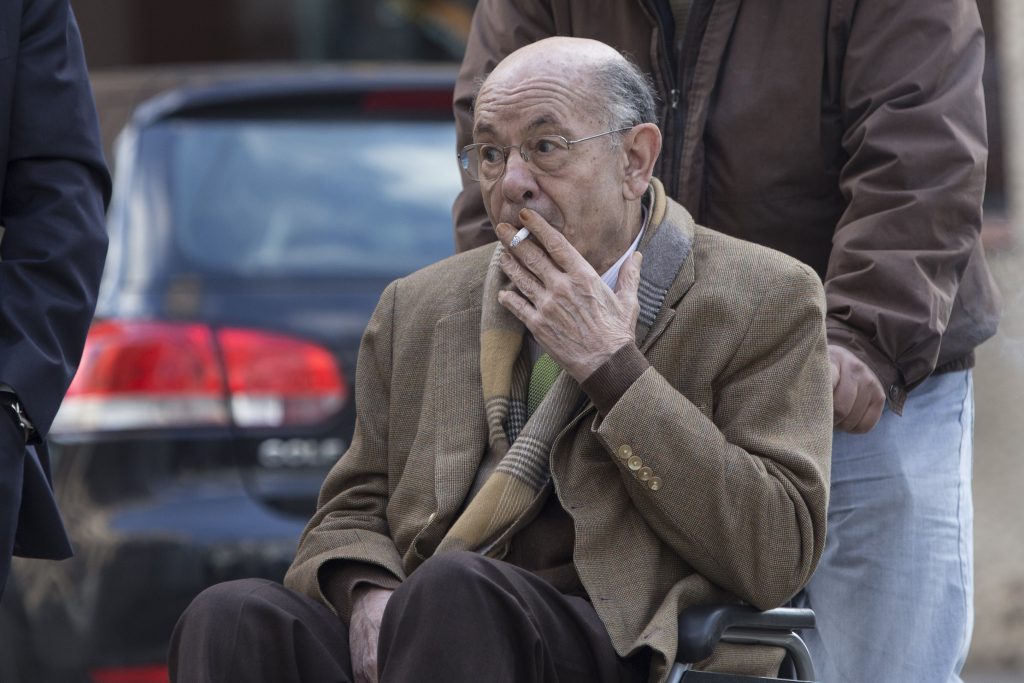01.03.2017 - 10:00
|
Actualització: 01.03.2017 - 11:07
One of the biggest corruption scandals affecting former governing party ‘Convergència Democràtica de Catalunya’ (CDC) which ruled in Catalonia in coalition with Christian Democrat Unió for more than 20 years, is put on trial this Wednesday. The so-called ‘Palau case’ investeigates whether CDC received €5.1 million from the construction company Ferrovial through donations made to Barcelona’s Palau de la Música concert hall. The judge, Josep Maria Pijuan, believes the money was allegedly given in exchange for the allocation of public work contracts. Fèlix Millet and Jordi Montull, the main managers of Palau de la Música at that time, have been the main focus of attention during the investigation, since there was evidence they might have stolen €26 million from the cultural organisation for their personal profit. Daniel Osàcar, who was party treasurer between 2005 and 2010, is also involved in the scandal. CDC, now renamed as PDeCAT have repeatedly denied the accusations “are not proven” and former Catalan President, Artur Mas described Osàcar as flawless.
In 2009 the director of the Palau de la Música Catalana in Barcelona, Fèlix Millet was accused of systematically raiding the coffers of this public body and confessed to embezzling €3.3 million. In 2012 he was placed on bail and the prosecutor sought six years imprisonment as well as massive fines.
Through a complex financial engineering, hundreds of thousands of euros from the Ferrovial construction company benefited CDC party finances after passing through the hands of Fèlix Millet, who pocketed a significant commission for himself.
When the Palau case exploded, the Barcelona prosecutors did not know of the political side to the situation and when it finally emerged in court, it would do so through a single individual linked to CDC, Daniel Osàcar.
The case shocked Catalan society when it was revealed eight years ago, since it was directly affecting Millet, who used to be a respectable person within the Catalan cultural landscape and the chairman of the Orfeó Català – Palau de la Música foundation. Furthermore, the case started by investigating Millet but soon Catalonia’s main political party – CDC – began to be affected by the case. The investigation was pointing out that some Palau de la Música funds might have allegedly been deviated towards CDC.
Nearly 20 people involved
In a 47-page final report, judge Josep Maria Pijuan accused a total of 17 people, although he admitted more people might be involved. However, he explained he has not been able to go any further with the investigation due to a lack of evidence. In this respect, he regretted the lack of cooperation by some banks and that the final destination of some of the stolen money is still unclear. Because of these limitations, the judge decided to end the investigation in order not to delay the trial any longer which will start in the coming months.
According to the report, Ferrovial was giving 4% of the cost of an allocated public contract for building some public infrastructure (including the construction of court houses, a metro line, etc) to the Palau de la Música’s foundation as a donation. Then, the judge states that 2.5% was going to CDC and 1.5% to Fèlix Millet and Jordi Montull as mediators. Pijuan explains that 80% of this last amount was for Millet and the remaining 20% for Montull. According to the judge, Ferrovial’s money were for “paying commissions for the allocation of public works by the Catalan Government and other public bodies, which was necessarilly made through a three-party agreement”.
The three parties were members of CDC, managers of Ferrovial and those of the Palau de la Música. The judge accuses Buenaventura and Elizaga Corrales of participating in the influence peddling case from the Ferrovial side. From the side of the political party, the judge accused two former treasurers of CDC: Carles Torrent – who died in 2005 – and Daniel Osàcar, who succeeded Torrent. In addition, the judge considered that the former Member of the Catalan Parliament Jaume Camps, of the CDC, would have received “some payment” at least once, “in March 2003, when he received from Fèlix Millet the amount of 5.45 million pesetas” (around €33,000).
According to the judge’s report, Millet “profiting from his absolute power” within the Orfeó Català – Palau de la Música foundation, in cooperation with Montull, Montull’s daughter – Gemma Montull – and Garicano, “plundered the funds” of the institution. Pijuan accuses them of paying for personal expenses such as house renovations and trips, with funds from the institution. In total they would have stolen €26 million, according to the judge.



